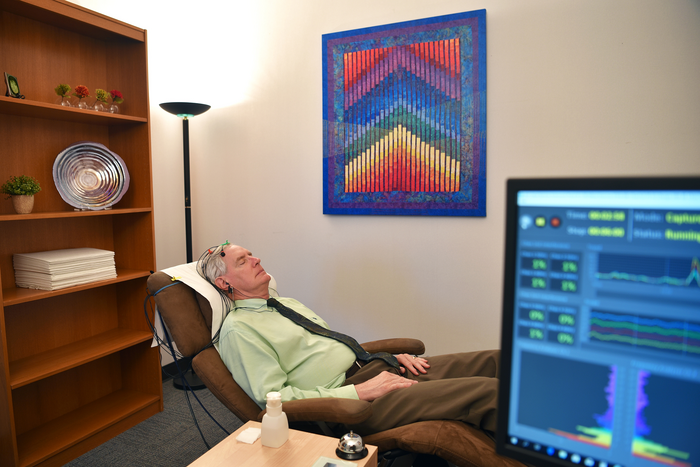WINSTON-SALEM, N.C. – Jan. 27, 2023 – A good night’s sleep is crucial to health and well-being. Numerous research studies have shown that insomnia can increase the risk of cardiovascular events, obesity, diabetes and other illnesses. Now, a new study from researchers at Wake Forest University School of Medicine shows significant improvements in not only sleep quality, but also in improved autonomic nervous system function using a closed-loop, acoustic stimulation neurotechnology.

Credit: Wake Forest University School of Medicine
WINSTON-SALEM, N.C. – Jan. 27, 2023 – A good night’s sleep is crucial to health and well-being. Numerous research studies have shown that insomnia can increase the risk of cardiovascular events, obesity, diabetes and other illnesses. Now, a new study from researchers at Wake Forest University School of Medicine shows significant improvements in not only sleep quality, but also in improved autonomic nervous system function using a closed-loop, acoustic stimulation neurotechnology.
The study is published online in Global Advances in Integrative Medicine and Health.
Cereset ResearchTM with Standard Operating Procedures (CR-SOP) is the evolution of HIRREM®, or high-resolution, relational, resonance-based electroencephalic mirroring, a noninvasive, closed-loop technology that uses scalp sensors to monitor brainwaves and software algorithms to translate specific frequencies into audible tones of varying pitch.
These tones linked to brainwaves are echoed back in real time via earbuds. This allows the brain a chance to listen to itself, to look at itself in an acoustic mirror.
“CR-SOP allows the brain to reset from stress patterns that contribute to insomnia,” said Charles H. Tegeler, M.D., chair of neurology at Wake Forest University School of Medicine. “During the intervention, the brain continuously updates with respect to its own activity patterns, resulting in auto-calibration or self-optimization.”
While still echoing brainwaves, as with legacy HIRREM, CR-SOP uses an updated platform with faster computers, new sensors and hardware, and computer management during the protocols. This results in faster echoing of brainwaves, shorter sessions and reduced dependence on technologist expertise.
In this randomized and controlled study of 22 adults, researchers compared changes on the Insomnia Severity Index (ISI), a self-report instrument to assess insomnia symptoms. About half of the participants received 10 sessions of CR-SOP linked to brainwaves while the control group received 10 sessions of randomly generated auditory tones. Sessions were received over a mean of 15.3 days. Researchers also recorded heart rate and blood pressure to assess autonomic cardiovascular regulation.
After completion of the sessions and at follow-up visits up to six weeks later, subjects in the CR-SOP group reported reduced insomnia symptoms. They also showed statistically and clinically significant improvements in autonomic function across multiple measures such as heart rate variability (HRV) and baroreflex sensitivity (BRS) compared to those who received random tones. HRV is a powerful biometric that reflects the health of the autonomic nervous system, and BRS measures blood pressure regulation. HRV is correlated with a host of important health and well-being outcomes.
These findings are in line with previous HIRREM research that showed a reduction in insomnia symptoms.
According to Tegeler, the study also used standard operating procedures so that all subjects received the same sequence of protocols. Taken together, this greatly increases the scalability of this approach so that more people might have access, more quickly, he said.
“Closed-loop acoustic stimulation can improve sleep as well as autonomic function in those who suffer from insomnia,” Tegeler said. “This pilot study demonstrates these benefits with CR-SOP from sessions received over a short period. This is also an important step in showing the intervention’s potential scalability for treating more people.”
Ongoing clinical trials are focused on stress and anxiety in health care workers as well as caregivers.
HIRREM and Cereset Research are registered trademarks of Brain State Technologies based in Scottsdale, Arizona and have been licensed to Wake Forest University School of Medicine for collaborative research since 2011.
This study was supported by research grants from The Susanne Marcus Collins Foundation Inc. and the Wake Forest Clinical and Translational Science Institute.
Journal
Global Advances in Integrative Medicine and Health
DOI
10.1177/27536130221147475
Method of Research
Randomized controlled/clinical trial
Subject of Research
People
Article Title
Cereset Research Standard Operating Procedures for Insomnia: A Randomized, Controlled Clinical Trial
Article Publication Date
18-Jan-2023




